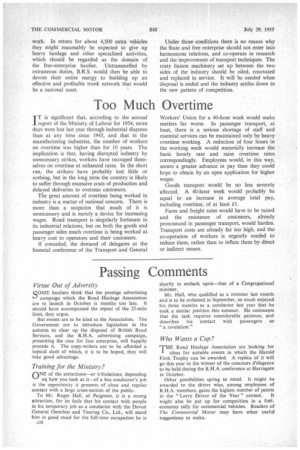Too Much Overtime
Page 34

If you've noticed an error in this article please click here to report it so we can fix it.
IT is significant that, according to the annual report of the Ministry of Labour for 1954, more days were lost last year through industrial disputes than at any time since 1945, and that in the manufacturing industries, the number of workers on overtime was higher than for 10 years. The implication is that, having disrupted industry by unnecessary strikes, workers have recouped themselves on overtime at enhanced rates. In the short run, the strikershave probably lost little or nothing, but in the long term the country is likely to suffer through excessive costs of production and delayed deliveries to overseas customers.
The great amount of overtime being worked in industry is a matter of national concern. There is more than a suspicion that much of it is unnecessary and is merely a device for increasing wages. Road transport is singularly fortunate in its industrial relations, but on both the goods and passenger sides much overtime is being worked at heavy cost to operators and their customers.
If conceded, the demand of delegates at the biennial conference of the Transport and General Workers' Union for a 40-hour week would make matters far worse. In passenger transport, at least, there is a serious shortage of staff and essential services can be maintained only by heavy overtime working. A reduction of four hours in the working week would materially increase the basic hourly rate and raise overtime rates correspondingly. Employees would, in this way, secure a greater advance in pay than they could hope to obtain by an open application for higher wages.
Goods transport would be no less severely affected. A 40-hour week would• probably be equal to an increase in average total pay, including overtime, of at least El.
Fares and freight rates would have to be raised and the resistance of customers, already pronounced in passenger transport, would harden. Transport costs are already far too high, and the co-operation of workers is urgently needed to reduce them, rather than to inflate them by direct or indirect means.
































































































